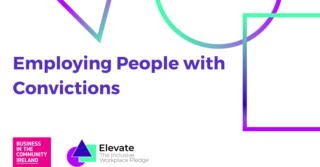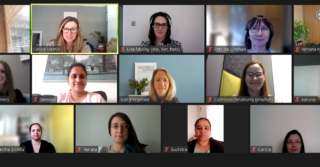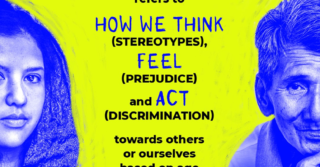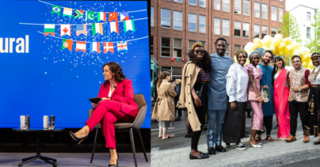Building a Culture of Allyship
Recent events like the #MeToo and #BlackLivesMatter movements as well as the impact of the Covid19 pandemic on minority groups have demonstrated the reality of inequity in the world. A recent research study revealed that 49% of people in Ireland would not like to see more Black people immigrating to Ireland, and the figure goes higher for Muslims.
While these figures and events paint a grim picture of the world in general, these incidents also shed light on the power of allyship and the possibility of converting these incidents into strong movements of change.
Allyship is a very strong tool to influence the culture of the organisation. Allies not only influence one person at a time, but their actions have a wide organisational impact. It is also a way of encouraging others to come forward and act as an ally to underprivileged minority groups.
What does Allyship look like?
Most of us are privileged in at least one way. That doesn’t mean we didn’t work hard or that we didn’t experience hardships in life. Nor does it mean we do not have a voice on inclusion. Sometimes people can think because they don’t have the lived experience they shouldn’t get involved. That is where allyship comes in.
Allyship is about recognising personal privilege or power and using it to advocate for people in underrepresented groups. To use privilege for good and to be a good ally you have to be aware, listen and speak up.
How to be an Ally?
Allyship is a lifelong process and allies do not wake up one day and decide to change the world with everything they do from now on. Allies are created by building relationships anchored with trust, accountability of actions and consistent interactions with minority groups over a period of time. It may be tempting to ask a few people for their experiences and generalise from the stories of one or two colleagues. Instead, support and mentor colleagues where you seem to have the most ability to influence the change. Also, while talking to your colleagues, be mindful of the mental trauma and emotional turmoil it can bring to those facing inequality at the workplace. You may try to start by asking questions like “Would you be comfortable….” Or “Can you advise …” instead of “I know what you feel….”
PhoenixRize is a diversity, equity, and inclusion (DEI) training, coaching, and consulting company in Ireland. At a recent workshop for employees of Business in the Community Ireland, Adaku Ezeudo from PhonenixRize shared key allyship actions at an individual, interpersonal and structural level:
Individual
- Challenge your biases
- Study historical challenges
- Use inclusive language
- Learn about your privilege
- Share your pronouns
- Make your work accessible
- Start a conversation about injustice at work
Interpersonal
- Vocally support and mentor colleagues from marginalised identities
- Amplify marginalised voices
- See something, say something
- Invite diverse voices
- Give credit for ideas
- Affirm experience of inequity
Structural
- Advocate for diverse, inclusive and equitable practices and policies
- Challenge lack of diversity at meetings, events or panels
- Distribute speaking time
- Ensure meeting environments are accessible
Employer initiatives on Allyship
Organisations are aware of the benefit diverse and inclusive workforces offer. To foster a diverse culture, organisations must educate their employees’ allyship and support the change it brings. A few actions that your organisation can take in building a culture of allyship are listed below:
- Awareness: As much as it has been talked about, not everyone is aware of the issues that some colleagues might be facing in the workplace. Educate your employees, give voices to people, make people aware of their privileges and how to utilise their power to support others.
- Accountability: Intentions and actions can be very different if the structural support is missing. While intentions may be there, allyship is meaningless if the actions of allies don’t have an impact. Encourage people to show up for others by ensuring that allyship is rewarded, and the company is accountable for taking tangible actions on the issues raised.
- Allow Feedback: The power of the privileged may be used for good, but there is also a constant need to deliberately seek feedback from the marginalised groups. To allow honest feedback, create an honest flow of discussions. Any feedback should not impact a colleagues’ position and their work dynamics with other colleagues.
- Allow Space: Not everyone is comfortable sharing their stories and speaking to a wider group. Fostering a culture of sharing and trust takes time – allow people space and time to come forward by themselves instead of feeling pressurised. Gradually build a safe space to allow employees to come forward and discuss any challenges that they may be facing.
- Enhance Culture: Encourage your employees to be vigilant about discriminatory behaviours and say something when they see something. The power to raise their voice when they witness discrimination can only be provided to the allies by the culture of the company. Teach them the habit of confrontation against discrimination. For example- encourage men to be allies for women. Similarly, anyone can support LGBTQ+ community irrespective of their own sexual orientation.
- Build a Community of Allies: The power of ‘more’ can be utilised to broaden the impact of allyship. Allow allies to create groups of colleagues interested in fighting inequality at the workplace. Use the forum to raise the questions and stand for the rights of the people who may be facing exclusion and inequality.
Success Stories
- AIB Universal Inclusion Campaign: In January 2022 AIB launched a major internal bank-wide campaign – Universal Inclusion – to reach the hearts and minds of all colleagues. The aim was to shift the focus to all employees and engage a wider audience, on the basis that anyone can experience exclusion, and everyone has a role in building an inclusive environment. A perception was identified among some colleagues that the Inclusion & Diversity (I&D) activities were for minority groups, and this was used as an opportunity to communicate the relevance of I&D for all and build a culture of allyship.
With more diversity at workplaces, organisations need more and more employees to come together to build an environment where everyone belongs, and everyone progresses together. Companies that embrace the reality of and accept the power of allyship will benefit from the advantages that a truly diverse and inclusive workforce brings with it.
Allyship is not about taking charge of the ship as the captain, instead it is being there for those whose voices need to be elevated to drive change.
Allyship is not about standing in your supremacy as a privileged person, or raising your own moral ground, instead allyship is a tool for melting the invisible walls of intersectional divide and treating everyone as equal.
Allyship is about decentring yourself and bringing everyone forward together. This is a tool to make the journey from ‘THEM’ to ‘US’.
The Elevate Pledge signatories have come together to learn and create solutions that support in building an inclusive workforce and have social impact on the Irish society.
To find out more about our Inclusive Workplace Pledge, Elevate, please click here.






